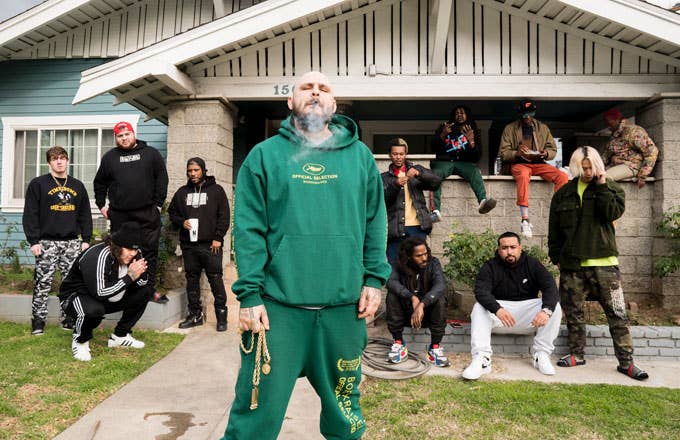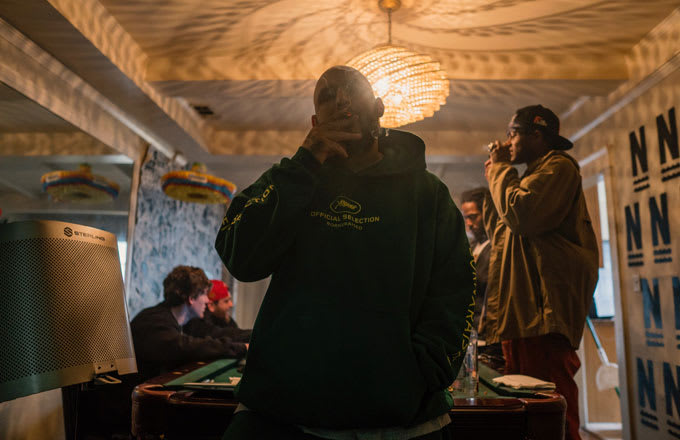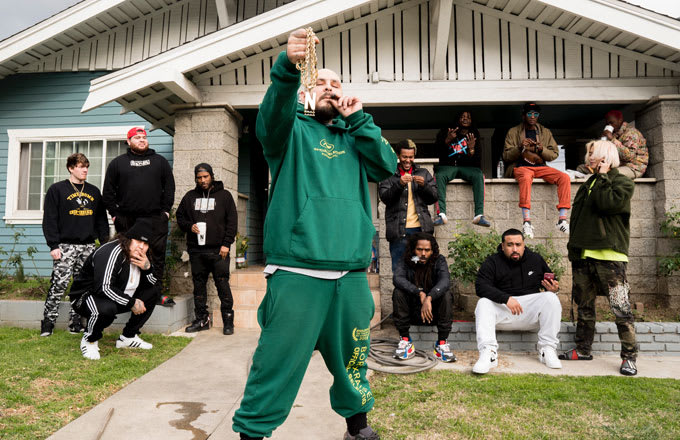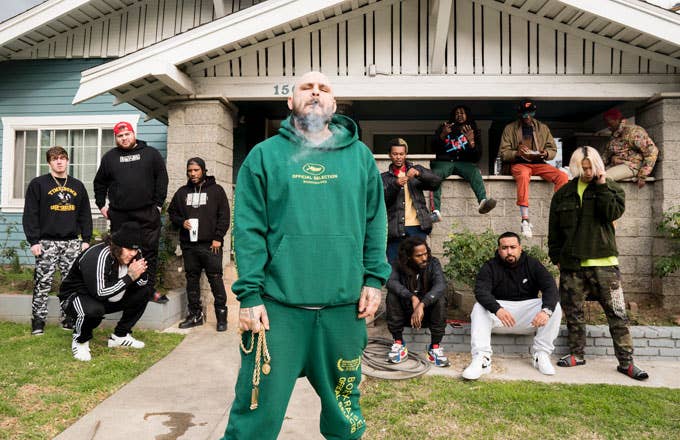
Most billboard advertisements for music streaming services are foregone conclusions: large posters for artists whose clout is so undeniable that the billboard-as-co-sign is painfully obvious and rarely very interesting.
Naturally, cruising down any major street in central Los Angeles offers no respite from these billboards, because, Hollywood. That is, until you get to Fairfax, where at the intersections of Melrose and later Beverly, the no-fucks-given visage of one Dro Fe cuts through the monotony with a “fuck you” stare and a chest full of chains and tats. His two billboards are minimalist, emblazoned with nothing more than his name in bold lettering, next to the words “UP NEXT.” Given Apple Music and Spotify’s tendency towards advertising the obvious, this forces the question: “Who the fuck is Dro Fe, and why don’t I know about him yet if he’s already billboard-worthy?”
You might not know Dro Fe (pronounced “fee”), but you certainly know his “traphouse.” Not far from the Fairfax District is a Hollywood studio where a few of your favorite rising artists have either recorded material (Valee, Uno the Activist, ManMan Savage), or filmed whole music videos—some of which were directed by Cole Bennett (Blueface’s “Bleed It,” and Matt Ox’s “Ride Around.”) Other artists stop by to either pay homage or, in the case of a Travis Scott, scope out what’s become a popular destination for the L.A. rap scene.
So who the fuck is Dro Fe? For one, he might be a marketing genius. During a phone interview with Complex, Dro has the humble but satisfied air of someone whose plan is finally coming together. As Dro confirmed during our talk, he isn’t an industry plant, nor part of some underground outreach campaign. In a bit of DIY savvy, he simply paid for the billboards himself and stylized them to look like actual streaming service ad campaigns.
“Out here, riding around L.A., I was seeing all of these Spotify and Apple Music [ads],” he says. “It will be, like, Post Malone or Ariana Grande. I'm thinking to myself, do mega-stars like that even really need promotion? If you're really trying to bring your revenue in, why would you put money into somebody who is already going to bring so many streams, when you should be putting money into people who aren't?” It’s a fair complaint, and one Dro set about solving himself, splashing down the money for the ad space and daring Spotify or Apple to say something. After all, that is technically where you can find his music: “If I had a washing machine appliance store, and I had Whirlpool or fucking Kenmore, I'd put up a billboard in my city like, ‘Yo, authorized Kenmore dealer, pull up to my shit.’ I was like fuck it: My music is on Spotify and Apple. I'm going to put that shit up, so boom.”
The attention blitz would be for naught if the mystery traced back to a bland SoundCloud rapper with reheated flows and an indistinguishable image. Within the first 90 seconds of speaking about his backstory, Dro revealed that he went to prison twice; joined and later left a rap group before striking out on his own; learned he had cancer; beat cancer; and left his home state of Texas for New York to resume his rap career before eventually landing in L.A. where he resides now. Later on, I’ll ask him if he looked at beating cancer as a sign to leave the streets and take music more seriously—a second chance at life, as it were. “More like my fourth,” is his matter-of-fact response. Dro Fe has lived a life, to say the least.
As he’s prone to reiterate several times, Dro is well into his 30s, which is to say he’s “not one of these little baby rappers.” Hailing from the Rio Grande Valley area of Texas, Dro lived half of his life on the southern border of Texas and Mexico, which is why he dubbed his movement “Narcowave.” A lifelong interest in music was hampered by a continued presence in the streets (he dropped out of school by ninth grade), being in and out of prison, and a group dynamic that ultimately didn’t work out.
I'm more of a man with one ball than anyone else that I've ever met.
The longer you speak with Dro Fe and the aperture of his story widens, the wilder the details become. He wasn’t just on the streets, “selling crack and weed,” he was homeless from 17 to 20. He didn’t just go to prison twice, he was convicted of three felonies and beat three felonies. He didn't just cheat death, he survived flipping his car eight times after falling asleep drunk at the wheel and walked away right as it exploded. He didn’t just beat cancer, he beat it twice. The first time didn’t just necessitate a malignancy surgical removal, it meant losing a testicle. “The first surgery was easy. They just cut off one of my balls, so I only got one ball, ’cause I had testicular cancer,” he explains passionately, but also more casually than most people would recall a tribulation like this. “But I always say I’m more of a man with one ball than anyone else that I’ve ever met.” The second bout with cancer wasn’t so easy.
“The dumb-ass doctor was like, ‘Don't trip, I'm going to do this surgery, and you’re going to be good,’” Dro recounts. “Then this other doctor kept calling me and I was like, ‘Damn, what does this nigga want?’ So I went to go get a check up, and sure enough that shit had spread to like my lymph nodes.” Recovery took almost a year and a half, following an invasive procedure as well as chemo—a period in which even Dro Fe, for all his manifest destiny spirit, saw his resolve wane.
“I was in a dark place. Like, I’d never [commit] suicide because I think that’s for cowards, but I would think about it,” he trails off. “I lost hella weight, my beard fell out... which is kind of like my identity. I was just going through it, dude. I was dying out there.” It took motivation from Kisandra, his partner and the mother of his kids, who was beside him throughout the entire ordeal, to recharge him. “When I started to get better, I was still kind of mentally like, ‘I'm dying.’ She pushed me out of it, like, ‘You've got to wake up, you got to go.’” Cut to Dro’s decision to move up north to New York and start taking rap seriously.

Dro Fe isn’t one of these “baby rappers,” a phrase he continually uses to communicate that he’s self-sufficient. That self-sufficiency is what elicited a lot of attention from others, without forcing him to go a gimmicky route like face tats, a colorful appearance, or some other shtick. That helped him create connections in New York, as Mike from the local staple Frank’s Chop Shop showed him around and facilitated introductions. He struck up a relationship with Sonny Digital, who did the same for him once Dro made the move to L.A. in 2016. The authenticity that drew others in also served as a roadblock, though.
Dro reasons that he’s so much of a genuine character, people almost didn’t believe him at first: “It’s almost like nowadays people are so used to seeing the fake and thinking it's real big. Nowadays, when people see the real, they think it’s fake.” Still, the financial stability he accrued gave him room to roll the dice on risks others wouldn’t be able to afford, like putting up billboards on Fairfax. Dro deliberately styled and promoted the billboards as if the DSP giants were in league with him. Spotify didn’t seem to mind, but Apple was a different story. The billboard, which he modeled after their “UP NEXT” campaign, complete with an Apple logo, went up on January 15. The morning of, he barely had time to take a picture before Apple called his “billboard guy” to hit them with a cease and desist, citing that Dro didn’t have the right to use their logo.
“So I was like, you know what, their campaign is called ‘Up Next.’ Fuck it, just take the Apple Music logo off and put that bitch back up,” Dro says. “So that’s why it’s a little bit off centered, because it's supposed to say Apple Music.” There’s also the matter of his now infamous “traphouse,” which he originally moved into with Sonny Digital and another producer, A.K. But when Sonny departed, it was up to Dro alone to keep up hefty rent payments of $4,500 a month and continue building what they had established there. “It’s a lot of sacrifice, like a lot of wasted money and a lot of shit that like I’ll never be able to get back.” Given the staple it’s become within the local L.A. scene and further, the investment was worth it. A transplant Texan who created one of the most organically creative communities in the industry has become someone who executives are actively trying to reverse-engineer.
I could be the realest nigga in the world, but if the music sucks, no one would be here.
“Everybody’s coming to me saying, ‘We want to build something like you have. How did you do it?’” he says. Dro doesn’t have any shortcuts to share. All he can boil it down to is integrity. “I’m just a real person. I’m one of the most gangster persons you’re going to meet, but I’m also one of the most genuine persons you’re going to meet, so people just really gravitate,” he reasons. “I think, really, the reason a lot of these youths comes by is because they’re missing the OGs. The ’90s and the 2000s, the crack epidemic, and fucking Reaganomics locked up all of the knowledgeable people from the street that had been through shit.”
Dro likens himself to a street professor, invoking his age once again. Plenty of people can see shit and live a mature life earlier than they’re expected to. But to Dro Fe, the fact that he’s in his 30s now, having only been going hard in rap since 2010, means he stayed in it a lot longer than your favorite rapper. He saw what they saw and more. He learned more. “You lived a street life, but how much did you really live? You was in and out, like, two years. That’s nothing. That’s... 600 days.”

Dro rationalizes his realness with mathematical breakdowns like it’s a preset equation. “Three-hundred and sixty-five times two times 24, so that’s only 17,000 hours,” he says. “Seventeen-thousand hours in the trap made you just a fucking legend that you are? Fuck out of here.” Over the phone, there’s no way of telling if he had a calculator in his hand, but he certainly sounded like he was rattling it off the top, which is quicker than I could despite seeing high school all the way through. “If you break down those hours into days, you’re really asleep a third of your lifetime,” he continues. “If you sleep eight hours a day, eight into 24 is a third of the day. I didn’t stop trapping when I was 21 because I got a record deal and [then moved to] L.A surrounded by record executives and fucking white girls, you know what I'm saying? I'm fucking in my 30s, still in the streets, doing all of this, all on my own.”
These stats are all objective to him, and not reserved for newer rappers, either. “You can even go back to legends like JAY-Z,” he points out. “JAY-Z made it when he was 26. All of these people who was in the streets for real, they all got on in their mid 20s, and that's cool, but that's not a very lengthy career in the streets. It gives you a lot of room to talk, but it doesn't really give you a lot of room to be like a professor, like what I am. All the kids come to me ’cause they know I’m going to give them that real nigga advice.”
Dro’s story is already better than most biopics, but if the music wasn’t up to par, none of it would matter. Sonically, Dro describes his music as dark energy, thematically “a handbook to the streets.” He says, “I could be the realest nigga in the world and all of that, but if the music sucks, no one would be here. I’ve never been into a session, I play the beat and no one rap on it.”
He handles production, too. His songs have sparse, dark beats with an even-keeled conversational flow that typically parcels bars out in Migos-esque triplets. His most recent project, December’s Narcowave 4, consisting of trapping anthems, was produced entirely by ChaseTheMoney. He has also recorded more heartfelt material that touches on the emotional side of street life, as well as his own struggles—content he’d typically just created for his own peace of mind. At the urging of friends who’ve heard and responded to the material, he’s preparing to show that side to the public on his next release, Big Narco Volume 2: Life of a Narco.
Life of a Narco will herald more billboards ahead of its March release. After that, Dro plans to take the Narcowave collective to Paris, where they’ll record with Brodinski for a Narcos in Paris EP tentatively set for summer. He also just wrapped a project with FKI 1st that revisits his Texan roots called In Love With the Drink (“I’m from Texas, I’ve been sipping my whole life”), a Screw tape homage that won’t feature screwed tracks but rather blends to create a continuous listen. All told, we’ll be hearing a lot more from Dro Fe before 2019 is even halfway done, if for no other reason then because he simply can’t stop. “It's literally the only thing that I like to do,” Dro admits. “I don't play no sports, I don’t…” he trails off again. “The only thing I want to do is be around my friends, be around my kids, my kids’ mother, hang out with them, go on vacations, and do music.”
With his vision, drive, and increasingly expanding profile, attention from the media and the industry seems sure to follow—Dro lists off Def Jam and Capitol as a few of the labels he’s been sitting down with lately to discuss Narcowave partnerships. “I think one of my biggest qualities is that I know how to watch, observe, and then capitalize, you know what I'm saying?” After talking to him for an hour because of a billboard that caught my attention, I know what he’s saying. If he keeps it up at the rate he’s been going, Apple might not have any choice but to hear him out officially, too.


